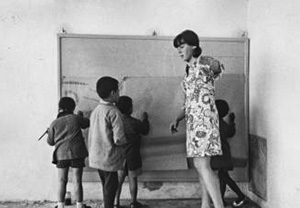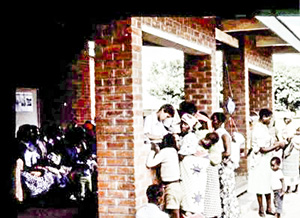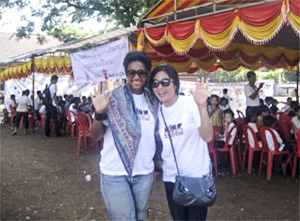Women Who Travel . . . in The Peace Corps
Thanks for the ‘heads up’ from Bea Hogan (Uzbekistan 1992-94)
What It Was Like to Serve in the Peace Corps, According to 6 Generations of Women
No matter when and where they served, volunteers agree: The experience will change your life.
If you’ve ever known someone who served in the Peace Corps, you’ve probably heard the phrase, “When I was in the Peace Corps . . ..” That’s how universally impactful the experience is.
Established by President John F. Kennedy in 1961, the agency has sent more than 240,000 volunteers to 141 nations around the world. Six decades on, its mission remains largely the same — to work with local communities to develop sustainable solutions for challenges in the healthcare, education, economic development, agriculture, and environmental sectors.
 The Peace Corps will commemorate its 60th anniversary with a themed celebration, “Peace Corps through the Decades: Sixty Years, Countless Stories,” next month. (Festivities culminate February 28 through March 1 with a clutch of virtual activities.) In that spirit, we asked eight intrepid women who’ve served in different decades since the agency’s founding to share how their time in the Peace Corps impacted their lives, careers, and global world views.
The Peace Corps will commemorate its 60th anniversary with a themed celebration, “Peace Corps through the Decades: Sixty Years, Countless Stories,” next month. (Festivities culminate February 28 through March 1 with a clutch of virtual activities.) In that spirit, we asked eight intrepid women who’ve served in different decades since the agency’s founding to share how their time in the Peace Corps impacted their lives, careers, and global world views.
The 1960s
Nathalie Weeks is a social worker based in Brooklyn. She served as a Peace Corps volunteer in Nigeria from 1966 to 1967 and a Peace Corps Response Volunteer in Zambia in early 2020, when she was evacuated due to the pandemic.
I was inspired to join the Peace Corps by my older sister who went to Colombia from 1963–65. I was assigned to a Catholic school in Sapele, a town of approximately 4,000 then, to teach the girls French and create after-school clubs. My fellow teachers were primarily Nigerian men. I was curious and open but feeling privately overwhelmed, though there was no way I was going to reveal that.
I met [my future ex-husband] Dennis during Peace Corps training. He was assigned to a school in Agbede, a day’s traveling time from Sapele. He visited me shortly after we began teaching, causing a bit of a scandal because there was nowhere for him to stay except in my little house. The headmistress was shocked! Within a few weeks, we decided to get married and I relocated to Agbede, because I was told that “in Nigeria, the wife goes.”
We were evacuated in the summer of ‘67 because of the civil war. I was among the 90 volunteers who floated down the Sapele River on a barge pushed by a small tugboat. We later learned that the pilot of the tugboat was shot on his way back up the river.
The Peace Corps influenced my decision to become a social worker. I also obtained an MBA, already aware of the challenging realities of running social welfare programs. My world view, my sense of service and the invaluable lessons of empathy, and my endless curiosity stem from that time. My decision to return to Africa with the Peace Corps in 2020 grew from a long-held sense that I never finished what I set out to do 53 years ago. Being evacuated after two months was a blow. I intend to return.
The 1970s
Linda Orsi Robinson is a certified nurse midwife based in Bar Harbor, Maine. Her international work has taken her to American Samoa, where she launched the first midwifery practice, and to the Democratic Republic of Congo with Doctors Without Borders. She served as a Peace Corps volunteer in Malawi from 1979 to 1981 and again from 2016 to 2018.
 The Peace Corps’ slogan in the 1960s was ‘the toughest job you’ll ever love.’ I was determined to join and jumped at the first opening that came up for my timeframe and skills. I had never heard of Malawi, which had recently changed its name from Nyasaland, so I went to the public library and looked it up in the encyclopedia. I learned it was a former British colony and a one-party “democracy” [with] a president for life. That was it.
The Peace Corps’ slogan in the 1960s was ‘the toughest job you’ll ever love.’ I was determined to join and jumped at the first opening that came up for my timeframe and skills. I had never heard of Malawi, which had recently changed its name from Nyasaland, so I went to the public library and looked it up in the encyclopedia. I learned it was a former British colony and a one-party “democracy” [with] a president for life. That was it.
Coming from a cold climate, the heat was a big adjustment. Food and water also; most of us got a debilitating bout of diarrhea. After that, we learned diverse survival skills: [how to] slaughter a chicken, negotiate at the market, cook over an open fire, respect and talk with the local chiefs, take a health history, and immunize mass numbers of children with one needle. It was exciting and fulfilling.
 As a new nurse, I saw how skilled and competent the Malawian nurses and midwives were, with hardly any resources. I saw how close to the land they work and how respect for their environment meant survival. I also saw how narrow our focus is in the U.S., and how arrogant we are about medical care and best practices. Most challenging was seeing suffering — much of it inflicted by Western cultures and colonialism — and knowing I couldn’t fix it. It’s one thing to learn this academically and another to witness it in practice. When I returned to the States I went back to midwifery school and devoted my life to improving health care for women. I’ve written three books and worked around the world. That all started in the Peace Corps.”
As a new nurse, I saw how skilled and competent the Malawian nurses and midwives were, with hardly any resources. I saw how close to the land they work and how respect for their environment meant survival. I also saw how narrow our focus is in the U.S., and how arrogant we are about medical care and best practices. Most challenging was seeing suffering — much of it inflicted by Western cultures and colonialism — and knowing I couldn’t fix it. It’s one thing to learn this academically and another to witness it in practice. When I returned to the States I went back to midwifery school and devoted my life to improving health care for women. I’ve written three books and worked around the world. That all started in the Peace Corps.”
The 1980s
Dr. Susan Hassig is an associate professor of epidemiology at Tulane University in New Orleans. She served as a Peace Corps volunteer in Thailand from 1980 to 1982.
I lived in two different cities in the northeastern part of Thailand, each of them a U.S. Air Force base. I learned Thai and [the locals] used to get a kick out of my mispronunciation. But I got better. The little kids in the community were great teachers, because they too were learning how to pronounce words correctly.
Our training in cultural competency was intense. I learned how to interact with Buddhist monks and that you don’t step on a coin because it has the image of the king. I came in with an attitude like, “I’m here to fix things.” But in fact, Thailand was doing pretty well already. My job was to help them do things better, but not in a way that would disrupt my supervisors’ chain of command and authority. I had to figure out how to facilitate change without just taking over and being the ugly American. That was an important set of skills to learn.
When I came home, people asked, “Oh, how was the Peace Corps?” but they only wanted the 30-second answer, not the hour-long answer I wanted to give them. That was frustrating because it was one of the best decisions of my life. It also changed my career trajectory. I had been debating whether to go to medical school when I learned about the field of public health from my Thai colleagues. That’s what set me on the path to becoming an infectious disease epidemiologist.
The 1990s
Dr. Megan Ranney is an emergency physician, director of Brown-Lifespan Center for Digital Health, and a CNN medical analyst based in Providence, Rhode Island. She served as a Peace Corps volunteer in Cote D’Ivoire from 1998 to 2000.
I was thrilled to be assigned to Cote d’Ivoire. I spoke French already and had some knowledge about the country [but] had no idea what to expect on the ground. The first month was tremendously overwhelming. It was like drinking from a firehose of information: customs, foods, language, and environment were all different. I had heat rash, I knew just about no one, but it was exhilarating.
My first month on site was the most difficult. I was in a small village without running water or electricity. There were no cell phones, no email. It took weeks to get letters from the United States. No one spoke English. I had no idea how to cook on a hot plate, struggled with filtering my water and washing my clothes by hand, and felt very out of my depth. It took a few months to develop friendships.
The Peace Corps changed my life. I was in C.I. during the height of the HIV epidemic, when antiretrovirals were impossible to get. I watched multiple friends from my and my fellow PCVs’ villages die of AIDS, often without an official diagnosis. I also witnessed, first-hand, the overlap between gender inequity and disease: I saw husbands infect wives, schoolteachers infect school girls, and lack of independence for women limit their ability to leave abusive relationships.
Although I was officially a “water & sanitation” volunteer, I pivoted to working with women’s groups and health centers to try to understand, educate, and improve care. The experience informs every choice I have made in my life since: my decision to be an emergency physician, so that I could treat anyone, any time, anywhere; and to be a researcher, so that I could document and improve on inequities in care.
But most importantly, my Peace Corps service gave me the gift of humility. One of my biggest lessons was that book knowledge does not equal real-life expertise. My experiences taught me how important it is to approach health, and healthcare decisions, with a deep respect for the lived experience of the patient. I started my service thinking I knew why things happened, or didn’t, and how to fix them. I finished my service understanding that I had only scratched the surface of the history and motivations of my Ivoirien colleagues, and knowing that the best I could do was to create space for their success.
The 2000s
Jalina Porter is a communications director and entrepreneur based in Washington, D.C. She served as a Peace Corps volunteer in Cambodia from 2009 to 2011.

Jalina Porter
During my sophomore year at Howard University, my business orientation professor shared his experience volunteering [with the Peace Corps] and what it did for his career in corporate America. He brought in a few recently returned African American volunteers to speak with our class. I already had a penchant for travel and foreign languages and loved the idea of service from my time as a Girl Scout. Plus, their motto — ‘Life is calling. How far will you go?’ — stuck with me. I always thought, “I am going to go very far in life, so this must be the program for me.” And it was.
I familiarized myself with the people, culture, and history of Cambodia before landing in the country. I was about a month into training when I caught Dengue fever. I was deathly sick — to the point where they considered medically evacuating me. But I pushed through the pain and resumed training after two weeks of being bedridden.
Growing up attending homogeneous schools, where I was the only person who looked like me, was no different from being a foreigner in Cambodia. Being abundantly proud of my Blackness made for a unique Peace Corps experience. Many of my fellow volunteers weren’t as receptive to me as my white colleagues but even with these microaggressions, I was still able to forge meaningful relationships.
My identity is embedded in my purpose. I helped educate not only my peers and village about my experiences both at home and abroad as an African American woman, but I co-hosted a roundtable in my province on racial and ethnic diversity. Even returning, I championed the Peace Corps to do more work to include HBCU students in their recruitment and advertising efforts. Peace Corps is an important diplomatic tool and I am committed to helping create an inclusive national security policy.
The 2010s
Karen Andrews is a retired real estate broker and Vietnam veteran based in Gresham, Oregon. She served as a Peace Corps volunteer in Thailand from 2013 to 2015.
After 10 weeks of training, I was sent to Lak Ha, a community in Damnoen Saduak to be an English co-teacher at Wat Prasartsit Community School. I was assigned to the second and sixth grades, with about 100 students in each level. I didn’t actively reveal [that I was] transgender because I wanted to be recognized for who I am, not what I am. When I was with my host families, I always felt protected and secure. But being a transwoman, and at my age, I decided not to go out after dark [unless] I was with other Peace Corps volunteers.
The most rewarding part about being a volunteer in Thailand was meeting the people. They are so friendly, caring, and generous. The most challenging was the heat and humidity. My first principal said to me, ‘We have three seasons in Thailand: hot, hotter, and hottest.’ Another was trying to get the teachers to be more student-centered instead of using rote memorization, which makes it harder to pick up conversational English. I developed word games that use the phonics alphabet. The students enjoyed the group competition and realized learning English is fun. I even taught a 10-week Saturday seminar in conversational English to 80 principals at the regional office and wrote an English language musical for my sixth-grade students to perform. There were 57 actors and 19 stage crew members, and the production was witnessed by 1,000 guests during three performances. I was so proud of the students.”
Jane Whitney is a healthcare professional based in Vermont. In 2017, at age 83, she served as a Peace Corps Response Volunteer in Malawi — and continues to travel and work abroad.
Being a Response Volunteer requires a one-year commitment and they take professionals, so it caters to older people. I was sent to Malawi for a position in program development and capacity building with Baylor Medical School’s Tingathe Project, an HIV initiative. I didn’t know anything about Malawi, but I was up for an adventure. I wanted to be of service to the world.
Just as I was starting the job, Mangochi [township] had a bloodsucker scare. Bloodsuckers are spirits that come through the walls, suck people’s blood, and make them very sick. Some locals believed the bloodsuckers were caused by the NGOs. The Peace Corps took our safety very seriously, so I had to live in a hotel in Lilongwe for a month or two and work from Baylor’s capital office. I never considered going home.
I had a very good relationship with the Malawians in the organization where I worked. Socializing with them was a high point. I missed my family, but what I’ve found is that when you go to remote, interesting places, your kids will come out. If I just lived in the suburbs, they’d have no reason to visit.
Some amazing stories. I love the last one because I live 250 miles from my children. They do come and I go there but especially now, there hasn’t been much travel either way. Perhaps I should think very seriously about another stint in the Peace Corps!